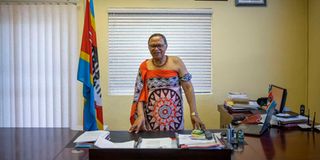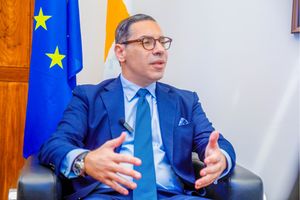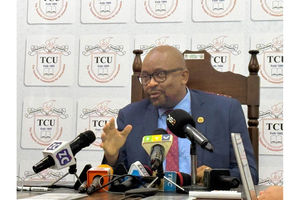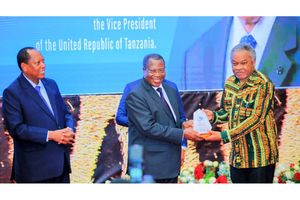Eswatini needs reforms, says deputy PM Themba Masuku

Eswatini Deputy Prime Minister Themba Masuku in his office in Mbabane, on October 29, 2021.
At least 37 people have been killed in pro-democracy protests in the country since June.
Africa's last absolute monarchy, Eswatini, needs to enact reforms in the wake of pro-democracy protests that have rattled the country since June, Deputy Prime Minister Themba Masuku told AFP.
"I would agree with those who say we need to have some change," he said in an interview in his office in the capital Mbabane.
Protests erupted in May after a law student's bloodied body was found dumped in the bush. Fellow students blamed police for the killing, and began staging protests demanding direct elections.
Teachers, unions and truckers have joined in the protests, which were violently dispersed in June. But new demonstrations have rumbled on, partly in anger at the arrest of two pro-democracy parliamentarians.
In October, new protests flared for more than two weeks, again met with deadly force until African mediators intervened.
At least 37 people have been killed in the unrest since June.
Masuku bristled at the notion that Eswatini is not a democracy, noting that the country holds elections and has a parliament.
Democratic system
However, political parties are banned, and elections take place in a convoluted system that ensures King Mswati III faces no meaningful dissent.
He inherited the throne from his father, King Sobhuza II, who ruled for 82 years and dismantled the fledgling democratic system created after independence from Britain.
The annual household budget, paid by the government, for Mswati and his 15 wives was last reported at $60 million (52 million euros) a year.
Nearly 60 per cent of his 1.2 million subjects live on less than $1.90 a day. One-quarter of adults have HIV, and one-quarter of children suffer chronic malnutrition, according to the United Nations.
Masuku insisted the king was open to dialogue, but only after January, when Mswati completes his annual three-month retreat. And Masuku insisted the protests must stop first.
"This doesn't have to happen because we have torched our schools, we have torched our clinics, we have threatened people with death, burning their houses," he said.
"We need to instil the rule of law, and the rule of law is not always comfortable for everybody."
The pro-democracy movement last week rejected the palace's calls for dialogue, accusing the monarch of seeking to appease mediators.





